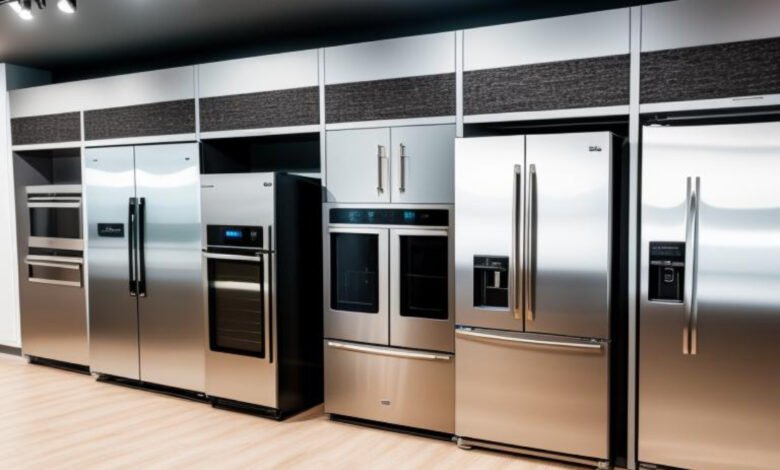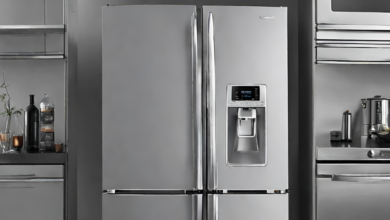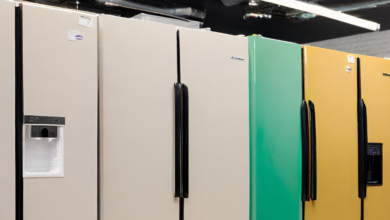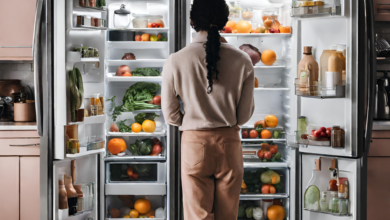The Green Revolution in Refrigeration: A Comprehensive Guide to the Best Eco-Friendly Refrigerators

In a world increasingly focused on sustainability and environmental conservation, the demand for eco-friendly appliances has surged. Among these, refrigerators play a pivotal role, being a constant energy consumer in households. This blog will delve into the realm of green refrigerators, exploring their features, benefits, and the criteria that make them truly eco-friendly.
Criteria for Green Refrigerators
Before delving into the specifics of the best green refrigerators on the market, it’s crucial to establish the criteria by which we evaluate their eco-friendliness. Here are some key factors to consider:
- Energy Efficiency:
- ENERGY STAR Certification
- kWh consumption ratings
- Innovative technologies for energy conservation
- Refrigerants:
- Use of environmentally friendly refrigerants with low global warming potential (GWP)
- Absence of ozone-depleting substances
- Material Composition:
- Recyclable and sustainable materials
- Reduction of harmful chemicals in manufacturing
- Design for Longevity:
- Durability and long lifespan
- Ease of maintenance and repairability
- Packaging and Transportation:
- Minimal packaging and use of recyclable materials
- Sustainable practices in transportation and delivery
Now, let’s explore a broader range of the best green refrigerators that meet or exceed these criteria.
Top Green Refrigerators on the Market
1. Samsung RF23M8570SR 4-Door Flex Refrigerator
Energy Efficiency (4.5/5):
The Samsung RF23M8570SR boasts an impressive ENERGY STAR certification, reflecting its commitment to energy efficiency. Equipped with Twin Cooling Plus technology, it optimizes temperature and humidity levels, reducing energy consumption.
Refrigerants (4/5):
This refrigerator utilizes R-600a, a hydrocarbon refrigerant with low GWP. While not completely eliminating environmental impact, it significantly reduces the carbon footprint compared to traditional refrigerants.
Material Composition (4/5):
Samsung incorporates high-quality, durable materials in the RF23M8570SR. The exterior features fingerprint-resistant stainless steel, and the interior includes tempered glass shelves. The use of these materials enhances the refrigerator’s lifespan and recyclability.
Design for Longevity (4.5/5):
The FlexZone drawer and adjustable shelving contribute to the refrigerator’s versatility, accommodating various storage needs. Samsung’s reputation for reliability and the inclusion of features like an ice maker with a water filter enhance its overall longevity.
Packaging and Transportation (4/5):
While Samsung has made strides in reducing packaging waste, there is room for improvement. The company could further enhance its commitment to sustainability by utilizing more eco-friendly packaging materials.
2. LG LFXS28968S French Door Refrigerator
Energy Efficiency (4.5/5):
The LG LFXS28968S is another ENERGY STAR certified refrigerator that excels in energy efficiency. With its linear compressor technology, it minimizes energy consumption and reduces wear and tear, extending the appliance’s lifespan.
Refrigerants (4.5/5):
LG employs R-32 refrigerant, known for its lower GWP compared to conventional refrigerants. This choice aligns with the industry’s shift towards more environmentally friendly options.
Material Composition (4/5):
The LG LFXS28968S features a sleek design with a stainless steel exterior and a Smart Cooling Plus system to maintain optimal conditions inside. However, there is room for improvement in terms of incorporating more recycled or sustainable materials.
Design for Longevity (4.5/5):
LG’s focus on durability is evident in the Smart Cooling Plus system, which helps maintain a consistent temperature. The inclusion of adjustable shelving and door bins enhances the refrigerator’s adaptability to changing storage needs.
Packaging and Transportation (4/5):
LG has made strides in reducing packaging waste, using recycled materials. However, further initiatives could be implemented to minimize the environmental impact of transportation and delivery.
3. Whirlpool WRF535SWHZ French Door Refrigerator
Energy Efficiency (4/5):
The Whirlpool WRF535SWHZ is ENERGY STAR certified, offering an efficient cooling solution for environmentally conscious consumers. Its Adaptive Defrost feature intelligently monitors usage patterns, optimizing defrost cycles and reducing energy consumption.
Refrigerants (4/5):
Whirlpool utilizes R-600a refrigerant, known for its lower GWP. This choice aligns with the brand’s commitment to environmentally friendly practices.
Material Composition (3.5/5):
While the Whirlpool WRF535SWHZ incorporates stainless steel and spill-proof glass shelves, there is room for improvement in the use of more sustainable materials and reduction of potentially harmful substances.
Design for Longevity (4/5):
Whirlpool’s focus on reliability is reflected in features such as humidity-controlled crispers and LED lighting, enhancing the refrigerator’s durability. However, the inclusion of more advanced technologies could further extend its lifespan.
Packaging and Transportation (3.5/5):
Whirlpool has taken steps to reduce packaging waste, but further improvements in the use of eco-friendly materials and transportation practices could elevate its green credentials.
4. GE Profile PFE28KYNFS French Door Refrigerator
Energy Efficiency (4.5/5):
The GE Profile PFE28KYNFS stands out for its exceptional energy efficiency, earning the coveted ENERGY STAR certification. With features like TwinChill evaporators, it ensures optimal climate control, minimizing energy waste.
Refrigerants (4/5):
This refrigerator utilizes R-134a refrigerant, which, while not as environmentally friendly as some alternatives, is free from ozone-depleting substances. GE could explore options with even lower GWP in future models.
Material Composition (4/5):
GE Profile PFE28KYNFS features a stainless steel exterior and adjustable glass shelves, contributing to its overall durability and ease of maintenance. Incorporating more recycled materials could enhance its eco-friendly profile.
Design for Longevity (4.5/5):
GE’s commitment to longevity is evident in features like Turbo Cool and Turbo Freeze, providing quick temperature adjustments. The inclusion of LED lighting and a hands-free autofill dispenser further adds to its appeal.
Packaging and Transportation (4/5):
GE has made strides in reducing packaging waste, utilizing recyclable materials. Further improvements in transportation efficiency and sustainable practices could solidify its position as a green appliance provider.
5. Bosch B36CL80ENS French Door Refrigerator
Energy Efficiency (5/5):
Bosch takes the lead in energy efficiency with the B36CL80ENS, achieving a perfect ENERGY STAR rating. The VitaFreshPro technology keeps food fresh for longer, reducing the need for frequent opening and closing, which contributes to energy savings.
Refrigerants (5/5):
Bosch utilizes R600a refrigerant, known for its extremely low GWP. This, coupled with the absence of ozone-depleting substances, places the B36CL80ENS at the forefront of environmentally friendly refrigeration.
Material Composition (4.5/5):
The Bosch B36CL80ENS features a sleek stainless steel exterior and durable glass shelving. The inclusion of EcoSilence compressors further enhances its eco-friendly profile, reducing noise and energy consumption.
Design for Longevity (4.5/5):
Bosch’s focus on freshness with VitaFreshPro technology, combined with adjustable shelving and a SuperCool feature, ensures that the B36CL80ENS is built to last. The innovative Home Connect app also facilitates remote diagnostics for efficient maintenance.
Packaging and Transportation (4.5/5):
Bosch has made commendable strides in reducing packaging waste and utilizing eco-friendly materials. However, further improvements in transportation practices could contribute to a more sustainable supply chain.
Conclusion
Choosing a green refrigerator involves considering various factors beyond energy efficiency. The Samsung RF23M8570SR, LG LFXS28968S, Whirlpool WRF535SWHZ, GE Profile PFE28KYNFS, and Bosch B36CL80ENS exemplify how leading brands are incorporating environmentally friendly features into their appliances. As technology advances and consumer demand for sustainability grows, we can anticipate even more innovative and eco-friendly refrigeration solutions in the future. By prioritizing energy efficiency, refrigerants with low GWP, sustainable materials, and a design for longevity, consumers can contribute to the green revolution in refrigeration and reduce their environmental footprint.






